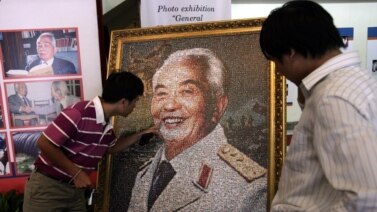
Hello again, and welcome back to As It Is. I’m Kelly Jean Kelly.
Vice President Joe Biden has been in Asia this week. The U.S. government hoped the vice president’s visit would help expand trade in the area. But another issue got in the way -- China’s claim to an expanded air defense identification zone.
In a surprise announcement last month, China said it was extending the zone to include the skies over Chinese territories in the East China Sea. The zone also now includes international waters, as well as territories that Japan and South Korea say belong to them. And China’s zone shares areas with air defense zones that Japan and South Korea have already created.
China says foreign countries must now present a flight plan before their planes enter its newly-claimed air defense zone. China says it has the right to deny entry into the airspace.
Several countries have ignored China’s demand already. The United States and Japan have flown planes into the zone without warning China. Taiwan says its military will continue to make usual oversight flights. And, in answer to China, South Korea is threatening to expand its own air defense zone.
China has dismissed other nations’ calls for it to drop its claim to the new zone. China says its actions do not violate international laws.
It has also threatened to take action against any aircraft that breaks the rule, but it did not say what that action might be. China does say it would not shoot down civilian airplanes.
Vice President Joe Biden spoke with Chinese leaders about the zone earlier this week.
“I was absolutely clear on behalf of my president: We do not recognize the zone. It will have no effect on American operations. Just ask my General. None. Zero.”
Mr. Biden said China’s actions show the need for systems to help officials deal with crises and improve communication.
Joseph Cheng is a political science professor at the City University of Hong Kong.
He says the vice president is trying to assure longtime allies Japan and South Korea that no harm will come from China’s actions. At the same time, Mr. Biden is trying to show the importance of American Chinese relations.
During his visit, Mr. Biden also met with Japan’s Prime Minister Shinzo Abe. The two leaders agreed that China’s expanded zone is a problem, and that Japan and the U.S. will work closely on the issue.
Mr. Abe says they also agreed they would not excuse any action that threatens the safety of civilian aircraft.
Hong Lei is China’s foreign ministry spokesman. He says China is willing to talk with Japan about the flight safety issue, but Japanese officials refuse to discuss it.
And that’s As It Is. I’m Kelly Jean Kelly.
Thanks for listening. If you would like reach us, send an email to learningenglish@voanews.com
Or go to our website -- learningenglish.voanews.com and click on “Contact Us.”





